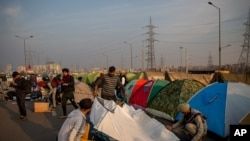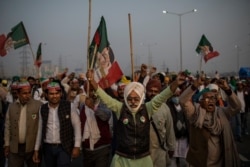Indian Prime Minister Narendra Modi has defended three controversial laws that have triggered the biggest farm protests in decades and blamed opposition parties for misleading the farmers.
But his outreach may not break the deadlock, as tens of thousands of farmers camped on highways outside New Delhi for the past month demanding concrete offers from the government to address their concerns.
The farmers fear that the laws liberalizing rules for the sale of farm produce favor private corporations and will hurt their incomes by eventually ending a decades-old system under which the government buys some crops, such as rice and wheat, at guaranteed prices.
In a virtual interaction Friday with farmers from six states, Modi assured them the legislation would benefit growers. “Through these agricultural reforms, we have given better options to farmers,” he said. He also reiterated that his government will not dismantle the program of buying grain at what is called “minimum support price.”
Modi’s interaction was the latest effort by his administration to placate the angry protesters, who have been demanding the laws be scrapped.
The farmers addressed by the Indian leader did not include any from Punjab and Haryana, however, two primarily agricultural states from where a majority of the protesters have gathered.
Modi blamed the protests on his political opponents, saying they are spreading lies about the laws. “All these people who are protesting in support of farmers, what did they do when they were in power,” he questioned. “Those with political motives are firing the gun from the farmers shoulders.”
On the highways outside Delhi that have turned into massive protest sites, the farmers did not appear to be convinced by Modi’s outreach as they continued shouting anti-government slogans and told reporters they will not call off their sit-in until the laws are rescinded.
They have categorically dismissed criticism that their protest has been incited by opposition parties and called it a “people’s movement” born out of genuine worries that the new laws will force them to abandon farming and sell their land.
Some braved Delhi’s cold winter nights, sleeping outdoors, others huddled under small tents or in tractors and trolleys covered with tarpaulin.
The laws passed in September have become a flashpoint for resentment that has been brewing for years among farmers over what they say are steadily dwindling incomes, especially for owners of small plots of land. They have been demanding higher prices for farm produce but fear the new laws will drive down prices as private companies become the dominant players in farm trade.
Modi offered more discussions Friday with the dissenting farmers to allay their concerns, saying his government is ready for talks, but they must be based on “issues, facts and logic.”
So far, six rounds of talks between farm leaders and the government have failed to break the stalemate as farmers seek legal guarantees the government will continue to offer them “guaranteed prices.”






